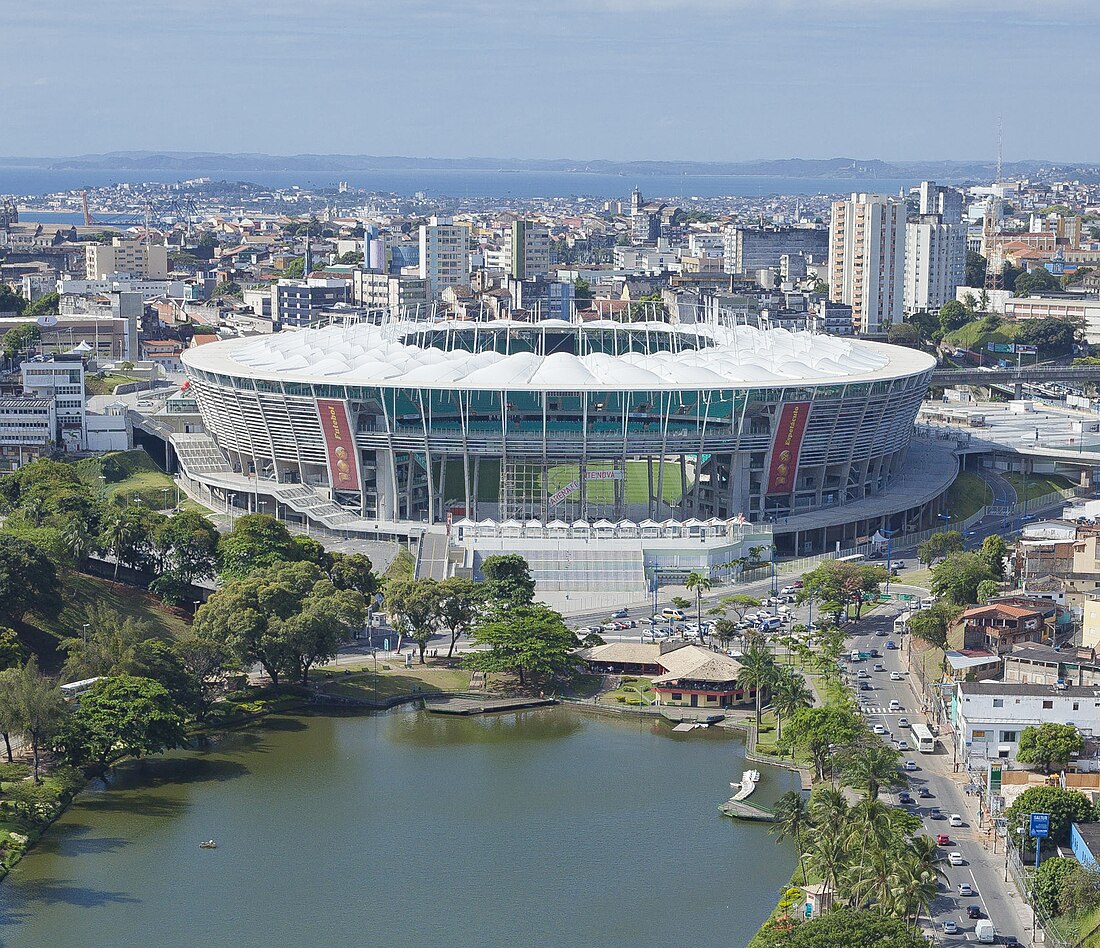Top Qs
Timeline
Chat
Perspective
Arena Fonte Nova
Football stadium in Salvador, Bahia, Brazil From Wikipedia, the free encyclopedia
Remove ads
The Casa de Apostas Arena Fonte Nova[3] is a football-specific stadium located in Salvador, Bahia, Brazil with a maximum capacity of 47,902 people.[1] The stadium was built in place of the older Estádio Fonte Nova. Its primary tenant is Esporte Clube Bahia.
The stadium was first used for the 2013 FIFA Confederations Cup and the subsequent 2014 FIFA World Cup, including the 5–1 win of The Netherlands over reigning World Champions Spain.[4]
The stadium was used as one of the venues for the football competition of the 2016 Summer Olympics held in Rio de Janeiro.[5][6] The stadium was also selected to host matches for the 2019 Copa America.[7] It is included in the list of venues bidding to host matches for the 2027 FIFA Women's World Cup.[8]
Remove ads
History
Summarize
Perspective
Following a collapse of a section of the Estádio Fonte Nova, which killed seven people and injured forty more, the governor of Bahia Jaques Wagner announced that the stadium would be demolished and a new stadium would be built in its place.[9]
A group of architects from Brunswick, Germany, which also redesigned the old Hanover stadium into a modern arena for the 2006 FIFA World Cup, was selected after a bidding process.[10] The old stadium was demolished in August 2010, with some of the concrete being reused in the construction of the new stadium. The rest of the concrete was used in projects around Salvador.[11]
In 2013, brewery Itaipava from Grupo Petrópolis bought the naming rights, turning the stadium into "Itaipava Arena Fonte Nova" under a sponsorship agreement until the year 2023, amounting to $100m. This was the first naming rights agreement signed for the 2014 World Cup stadiums.[12] After the contract ended, betting website Casa de Apostas bought the naming rights in 2024.[13]
The stadium was inaugurated on April 5, 2013 by President Dilma Rousseff.[14] The first match was played on April 7, 2013, with a Campeonato Baiano game in which Vitória defeated rival Bahia 5–1. The first player to score a goal in the stadium was Vitória's Renato Cajá. During this match, some supporters were unable to see the game completely due to some blind spots.[15] The stadium had excessive dust and some puddles.[15] The company responsible for the stadium, owned by Grupo OAS and Odebrecht, said it was aware of the problems.[15]
On May 27, 2013, a section of the roof collapsed after heavy rain.[16]
Remove ads
Design

In addition to football matches, the stadium was designed to be able to host concerts, entertainment, and business events. The multipurpose model was based on the one used in Amsterdam Arena.[17]
Arena Fonte Nova pays homage to the original stadium, preserving the horseshoe design with an opening to the Dique do Tororó.[18]
The new modern roof, which covers all of the seats in the venue, was inspired by the AWD-Arena in Hanover, Germany. The roof consists of a lightweight metal structure based on the ray and ring system, covered with a PTFE membrane and supported by external pillars.[11]
Remove ads
Public transportation
Arena Fonte Nova is accessible from the Campo da Pólvora station of the Salvador Metro.[19]
Football games
2013 FIFA Confederations Cup
2014 FIFA World Cup
2016 Summer Olympics - Men's Football
2016 Summer Olympics - Women's Football
2019 Copa América
Brazil national football team
Remove ads
Concerts
Remove ads
See also
References
External links
Wikiwand - on
Seamless Wikipedia browsing. On steroids.
Remove ads


